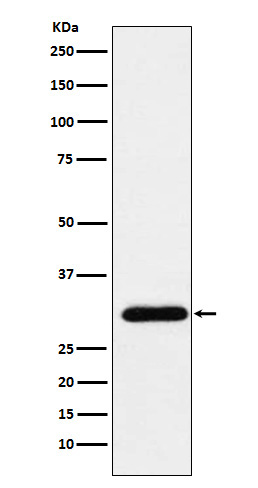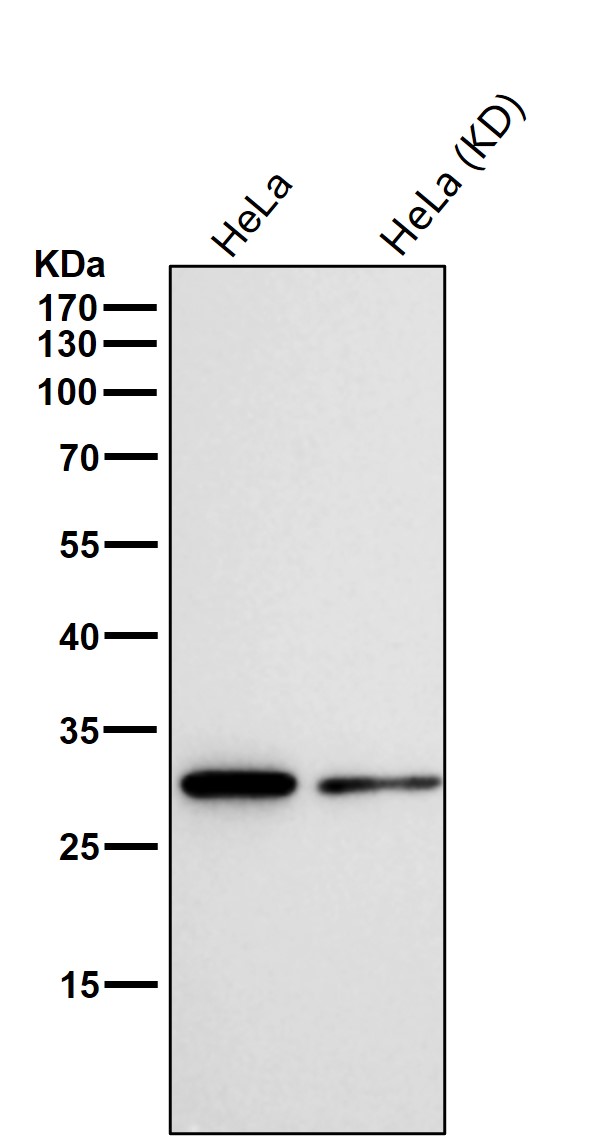

| WB | 咨询技术 | Human,Mouse,Rat |
| IF | 咨询技术 | Human,Mouse,Rat |
| IHC | 咨询技术 | Human,Mouse,Rat |
| ICC | 技术咨询 | Human,Mouse,Rat |
| FCM | 咨询技术 | Human,Mouse,Rat |
| Elisa | 1/5000-1/10000 | Human,Mouse,Rat |
| Aliases | BTF4; Gtf2f2; RAP30; TF2F2; TFIIF; TFIIF beta;;GTF2F2 |
| WB Predicted band size | Calculated MW: 28 kDa ; Observed MW: 30 kDa |
| Host/Isotype | Rabbit IgG |
| Antibody Type | Primary antibody |
| Storage | Store at 4°C short term. Aliquot and store at -20°C long term. Avoid freeze/thaw cycles. |
| Species Reactivity | Human,Mouse,Rat |
| Immunogen | A synthesized peptide derived from human GTF2F2 |
| Formulation | Purified antibody in PBS with 0.05% sodium azide,0.05% BSA and 50% glycerol. |
+ +
以下是关于CORO1A抗体的3篇代表性文献(示例为假设性描述,实际文献需通过数据库核实):
1. **文献名称**: "Coronin 1A deficiency alters T cell homeostasis and promotes immunodeficiency"
**作者**: Moshous D, et al.
**摘要**: 研究通过CORO1A特异性抗体分析患者免疫细胞中CORO1A蛋白表达缺失,揭示了CORO1A基因缺陷导致T细胞发育异常及严重联合免疫缺陷的机制。
2. **文献名称**: "CORO1A regulates phagocytosis and mitochondrial metabolism in macrophages"
**作者**: Jayachandran R, et al.
**摘要**: 利用CORO1A抗体进行免疫荧光和Western blot实验,发现CORO1A通过调控巨噬细胞中吞噬体成熟和线粒体能量代谢影响先天免疫应答。
3. **文献名称**: "Anti-CORO1A autoantibodies in systemic lupus erythematosus: Diagnostic and functional implications"
**作者**: Li Y, et al.
**摘要**: 报道了系统性红斑狼疮(SLE)患者血清中存在抗CORO1A自身抗体,并通过ELISA和蛋白质印迹验证其与疾病活动的相关性,提示其作为生物标志物的潜力。
如需具体文献,建议通过PubMed或Google Scholar搜索“CORO1A antibody”或“coronin 1A antibody”获取最新研究。
CORO1A (Coronin 1A) is a member of the coronin protein family, which is evolutionarily conserved and plays critical roles in regulating the cytoskeleton, particularly actin dynamics. Primarily expressed in immune cells such as T lymphocytes, dendritic cells, and macrophages, CORO1A is involved in cellular processes like cell migration, phagocytosis, and immune signaling. It interacts with actin filaments and modulates their assembly, impacting immune cell function and homeostasis. Mutations or deficiencies in CORO1A are linked to immunodeficiency disorders, including severe combined immunodeficiency (SCID), highlighting its importance in immune system regulation.
CORO1A antibodies are essential tools for studying the protein's expression, localization, and function in both physiological and pathological contexts. They are widely used in techniques like Western blotting, immunofluorescence, and flow cytometry to investigate CORO1A's role in immune cell development, autoimmune diseases, and host-pathogen interactions. For example, research has shown CORO1A's involvement in T-cell receptor (TCR) signaling and its ability to suppress excessive inflammatory responses. Additionally, these antibodies aid in exploring CORO1A's dual role in cancer, where it may act as a tumor suppressor or promoter depending on the cellular context.
Commercially available CORO1A antibodies are typically validated for specificity across human, mouse, and rat samples. Their applications extend to clinical research, particularly in diagnosing immune deficiencies and understanding molecular mechanisms in infectious diseases like tuberculosis, where CORO1A influences mycobacterial survival in host cells. Proper validation remains crucial to ensure reliable experimental outcomes.
×